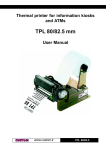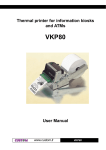Download Citizen Watch Instruction manual
Transcript
Thank you for your purchase of this Citizen watch. Before using the watch, read this instruction manual carefully to ensure correct use. After reading, be sure to store this manual in a safe place should it be needed for future reference. ✳ The case has different features depending on the model. Details of the case features are not contained in this manual, see “ http://www.citizenwatch.jp/support/default.htm ”. To determine the movement number Engraving position example Your watch features a case number engraved on the case back (refer to figure to the right). The first four characters of the case number represent the movement caliber number of the watch. The engraving position may differ In the example on the right, “1234” is the movement depending on watch model. number. 1 Safety precautions This manual may contain certain safety advisories. Your watch should be used in accordance with these advisories at all times to ensure optimal enjoyment of your watch and to prevent injury to yourself, other persons and/or damage to property. ■ Safety advisories are categorized and depicted in this manual as follows: Highly likely to cause death or serious injury May cause serious injury or death May or will cause minor or moderate injury or damage ■ Important instructions are categorized and depicted in this manual as follows: Warning (caution) symbol followed by instructions that should be followed and/or precautions that should be observed. Warning (caution) symbol followed by prohibited use and/or operation advisory. 2 Before using the watch The followings must be done before using the watch: ● Checking the power reserve Page 8 Check the charge level of the watch. ● Checking the time signal reception Page 9 Check the result of the time signal reception. ● Setting the city Page 10 Select the city for which you want to indicate the time and date. 3 Table of contents Before using the watch............... 3 Component identification........... 6 Checking the power reserve........ 8 Checking the time signal reception ................................ 9 Setting the city ........................10 Notes on the time signal reception ..............................14 On-demand reception—manual signal reception activation.....22 During the Daylight Saving Time season...................................24 Recharging your watch .............30 Adjusting the time/calender manually...............................34 4 Checking and correcting the current reference (0) position ............. 38 Precautions and usage limitations...................55 Troubleshooting.......................42 Maintenance............................60 Solar-powered watch handling precautions ...........................48 Information .............................61 Specifications...........................62 Water resistance ......................52 5 Component identification Hour hand Minute hand Upper right button (B) Date indicator Signal reception indication (OK/RX/NO) Crown Second hand City indication 6 Lower right button (A) Daylight saving time indication (ON/OFF) The illustrations in this instruction manual may differ from the actual appearance of your watch. How to use the screw down crown and screw down push button Some models feature a screw down crown and/or screw down push button. Locking the crown and/or button prevents accidental operation. These must be unlocked prior to using certain features of your watch such as setting the time or date. Unlock Lock Screw down crown Rotate the crown counterclockwise until it releases from the case. Push the crown in to the case. With gentle pressure towards the case, rotate the crown clockwise to secure it to the case. Be sure to tighten firmly. Screw down push button Rotate the locking screw counterclockwise, and loosen until it stops. Rotate the locking screw clockwise, and tighten firmly. Some models feature a recessed button. Press the button with a narrow-tipped object such as a wooden toothpick. 7 Checking the power reserve 1. Ensure that the crown is in position . 2. Press and release the lower right button A. • When the charge of the watch is low, the second hand rotates a quarter counterclockwise. You need to charge the watch. See page 30. 3. Press and release the lower right button A. The watch will resume normal operation. Crown position • The watch will resume normal operation automatically after 10 seconds even without pressing the button. The second hand indicates “OK” or “NO” at the end of this procedure to show the reception result of the time signal. 8 Checking the time signal reception 1. Ensure that the crown is in position 2. Press and release the lower right button A. . The second hand moves and indicates the reception result. OK Reception has succeeded. NO Reception has failed. When reception has failed, see page 22. When reception has been successful 3. Press and release the lower right button A. Crown position The watch will resume normal operation. • The watch will resume normal operation automatically after 10 seconds even without pressing the button. 9 Setting the city Select the city for which you want to indicate the time and date. 1. Pull the crown out to position Crown position 2. Rotate the crown to select the city for which you want to indicate the time and date. • For details of the selection of cities, see pages 11 to 13. • Each time you select a city, the time and date of the city you have selected will be indicated. 3. Pull the crown out to position When “New York” (49 seconds position) is selected 10 . The second hand moves to indicate the currently selected city. . The second hand rotates to indicate the current Daylight Saving Time (SMT) setting. • You can change the setting by rotating the crown. For details, see pages 24 to 29. 4. Push the crown in to position . The watch resumes normal operation. (The current time is indicated.) Table of selectable cities • The cities listed in the table below may be abbreviated or spelled out, depending on the model. • The signal station is changed depending on the selected city. Some cities cannot receive the signal though the signal station is assigned in the list. • When you use the watch in a place which is not shown in the table below, select the city in the same time zone one as the city you want to indicate. • The time difference in the table below is based on UTC. / , the result of the Daylight Saving Time check • For cities indicated by signal reception is memorized in common. Indication London Paris Athens Moscow Dubai LON PAR ATH MOW DXB Second hand position 0 2 4 7 9 City name London Paris Athens Moscow Dubai Time difference 0 +1 +2 +3 +4 Signal from... Germany Continued on the next page 11 Indication Karachi Delhi Dhaka Bangkok KHI DEL DAC BKK HKG Hong Kong or or Beijing BJS Second hand position 11 14 16 18 21 City name Karachi Delhi Dhaka Bangkok Hong Kong or Beijing Time difference +5 +5.5 +6 +7 China +8 Tokyo TYO 23 Tokyo +9 Adelaide ADL 25 Adelaide +9.5 Sydney SYD 28 Sydney +10 Noumea NOU 30 Noumea +11 Auckland AKL 32 Auckland +12 12 Signal from... Japan Second hand position City name MDY 35 Midway Island -11 Honolulu HNL 37 Honolulu -10 Indication Midway Time difference Anchorage ANC 39 Anchorage -9 L.Angeles LAX 42 Los Angeles -8 Denver DEN 44 Denver -7 Chicago CHI 46 Chicago -6 New York NYC 49 New York -5 Santiago SCL 51 Santiago -4 R.Janeiro RIO 53 Rio de Janeiro -3 F.Noronha FEN 56 Fernando de Noronha -2 58 Azores -1 Azores PDL Signal from... USA Germany For details of each signal station, see pages 16 to 19. 13 Notes on the time signal reception Receiving the time signal There are three ways to receive the time signal: Methods Explanations Receives the signal at 2:00 a.m. every day. If reception is Automatic reception unsuccessful, the watch tries to receive at 3:00 a.m. and 4:00 a.m. On demand reception Receive the signal manually when you want to adjust the time and date. See page 22. Recovery automatic Receives the signal automatically after charging when the reception watch stops due to insufficient charge. The second hand indicates the reception result (OK/NO). (See page 9.) 14 • The time signal reception function cannot be deactivated. • Even when this watch receives a time signal successfully, the accuracy of the displayed time will be dependent on the reception environment and internal processing. • If the watch is not able to receive the signal, it will operate normally within an accuracy range of ±15 seconds per month. When receiving the time signal Remove the watch and place it on a stable surface where it can receive the signal better, such as next to a window. • The reception antenna is located at the 9:00 position of the watch. Place the watch with the 9:00 position facing toward the station. • Do not move the watch during time signal reception. • The watch will not receive a time signal when in a low charge state as indicated by the second hand moving in two second increments (the insufficient charge warning). Charge the watch before reception. 15 Note on the time signal This watch receives the time signal from the five signal stations located in four regions and automatically adjusts the time and date. The receivable signal stations are listed as follows: Signal stations Fukushima station, Japan Kyushu station, Japan Kind of the time signal JJY Fort Collins station, Denver, Colorado, USA WWVB Mainflingen station, Southeast Frankfurt, Germany DCF77 Shangqiu station, Henan, China BPC Refer to the maps on pages 17 to 19 to see the locations of the signal stations and their receivable area roughly. 16 Approximate receivable area The distance of receivable range is only used as an approximate value. It is often affected by the receiving environment and weather. • The value of the distance is a radius of the value from the signal station. JJY (Japan): Approx. 2000 km Kyushu station JJY (Japan): Approx. 1500 km Fukushima station Continued on the next page 17 The distance of receivable range is only used as an approximate value. It is often affected by the receiving environment and weather. • The value of the distance is a radius of the value from the signal station. WWVB (USA): Approx. 3000 km Fort Collins station 18 The distance of receivable range is only used as an approximate value. It is often affected by the receiving environment and weather. • The value of the distance is a radius of the value from the signal station. BPC (China): Approx. 1500 km Shangqiu station DCF77 (Germany): Approx. 1500 km Mainflingen station 19 Poor reception areas It may be difficult to receive the time signal properly under certain environmental conditions or in areas susceptible to radio noise. • Extremely hot or cold locations • Near high-tension electrical lines, railway overhead wires or communication facilities • Inside vehicles • Inside reinforced concrete buildings, between tall buildings, mountains, or underground • Near electrical equipment or office appliances 20 • Near mobile phones that are in use When signal reception is poor High-tension electrical lines or others structures near your house may block the path to the signal location. This may cause a poor environment for receiving the time signal. With reference to pages 17 to 19, search for a better place for reception. Then, attempt to receive the time signal following the procedure on pages 22 and 23. 21 On-demand reception—manual signal reception activation Crown position 22 You can adjust the watch by receiving the time signal any time when the time and date are not correct or the reception result is “NO.” • The watch will not start to receive if the second hand is moving once every two seconds (this is the insufficient charge warning). Fully charge the watch before attempting on-demand reception. • Not all areas can receive a signal. Be sure you are not in such an area and confirm the city is selected for your time zone. See pages 10 to 13. 1. Ensure that the crown is in position . 2. Press and hold the lower right button A for two or more seconds. The second hand moves to “RX” and the watch starts receiving. After receiving the time signal, the second hand will move normally. While receiving the • Place your watch on a stable surface where it will not signal be disturbed during the update process. • It takes from two to fifteen minutes to complete the time signal reception. Successful signal reception The time will be updated and the watch will resume normal operation. Failed signal reception Normal operation resumes with previously set time. To cancel the reception Press and hold the lower right button A for two or more seconds. Cancel the reception and the current time will be indicated. 23 During the Daylight Saving Time season Before proceeding, please know the movement type in your watch. Please refer to page 1 for this determination. Some areas observe Daylight Saving Time. • Daylight Saving Time rules will vary depending on the country or region within a country. Movement caliber H144 When the watch receives a time signal, the Daylight Saving Time setting is automatically updated. The time signal update overrides any manual settings that may have been made. If you live in an area that does not observe Daylight Saving Time, you may need to use alternate city for correcting the time. See pages 10 to 13. Movement caliber H145 When the watch receives a time signal, the Daylight Saving Time setting is automatically updated, provided the user has not manually turned OFF overridden the Daylight Saving Time setting. If you live in an area that does not receive a time signal, you will need to update the Daylight Saving Time setting manually. See page 26. 24 Checking the Daylight Saving Time setting (both movement calibers H144 and H145) 1. Pull the crown out to position . The second hand will rotate to indicate the Daylight Saving Time set in memory. ON Daylight Saving Time is on and time is advanced. OFF Daylight Saving Time is off. 2. Push the crown in to position . When Daylight Saving Time is on Crown position 25 To manually change the Daylight Saving Time setting 1. Pull the crown out to position . 2. Rotate the crown to choose the city. • For details of the selection of cities, see pages 11 to 13. 3. Pull the crown out to position Crown position . • Rotate the crown clockwise to activate Daylight Saving Time (turn on). or • Rotate the crown counterclockwise to deactivate Daylight Saving Time (turn off). 4. Push the crown in to position . Special note about movement caliber H145 When manually changing the Daylight Saving Time from OFF to ON to OFF, this engages the manual override built into movement caliber H145. This manual override precludes Daylight Saving Time from being automatically adjusted during the time signal update. If this function is not desired, the only way to cancel the manual override is to do the reset and 0-Positioning outlined on page 46. 26 <Cities sharing the Daylight Saving Time setting> The Daylight Saving Time / standard time is shared and automatically updated among the cities within each table below. Areas receiving the signal from USA Anchorage (Anchorage/ANC), Los Angeles (L. Angeles/ LAX), Denver (Denver/DEN), Chicago (Chicago/CHI), New York (New York/NYC) Areas receiving the London (London/LON), Paris (Paris/PAR), signal from Germany Athens (Athens/ATH), Moscow (Moscow/MOW), Azores (Azores/PDL) When changing to a city other than outlined in the chart above: Movement caliber H144 Time signal overrides any manual setting of the Daylight Saving Time. Movement caliber H145 Daylight Saving Time is set in accordance with the lastreceived time signal. However, when manual override has been activated, the time signal will not update the time zone with the manual Daylight Saving Time override. • For how to check the movement number, see page 1. 27 If you live in an area that does not observe Daylight Saving Time <Movement caliber H144> Anytime a time signal is received, any manual Daylight Saving Time is overridden and set in accordance with the time in the time signal. If you live in an area that does not observe Daylight Saving Time, it will be necessary for you to utilize an alternate time zone to have the correct time shown (see pages 10 to 13). e.g. The current city setting is +2 hour time difference. Select the city with +1 hour time difference. Caution You must change the city setting to the correct time zone city after the Daylight Saving Time season has finished. 28 If you live in an area that does not observe Daylight Saving Time (continued) <Movement caliber H145> Movement caliber H145 will “remember” a manual Daylight Saving Time setting. As such, if you manually turn the Daylight Saving Time to “OFF” for a particular time zone, it stay “off ” and not be affected by any time signal update. It is important to note however that with the change of each Daylight Saving Time, you will need to manually turn the setting ON or OFF as outlined on page 26. The only way to cancel any manual override setting is to do the reset and 0-positioning procedure as outlined on page 46. 29 Recharging your watch This watch has a rechargeable cell which is charged by exposing the dial to light such as direct sunlight or fluorescent lamps. For optimal performance: • Expose the watch with the dial facing towards direct outdoors sunlight (not through a window) for five to six hours at least once a month. • After taking off the watch, put it in a position where the dial is exposed to bright light, such as by a window. • Before storing the watch in a dark place for an extended period of time, be sure to charge it fully. When the watch is regularly covered with long sleeves, it may not be charged sufficiently. Try to keep the watch exposed to light sufficient for charging. Do not charge the watch at a high temperature (about 60˚C/140˚F or higher). 30 When the watch reaches a low charge state—insufficient charge warning function When the power reserve becomes low, the second hand moves once every two seconds—This is the insufficient charge warning function. Charge the watch by exposing the dial to light. • After the watch is fully charged, the second hand will resume normal operation. • If you have not charged the watch for three days or more since the insufficient charge warning movement began, the watch will run out power and stop. Caution • Even when the second hand moves once every two seconds, the current time and date are indicated. However, no other functions or time signal reception will operate under a lower power state. • When you check the power reserve (page 8) or the time signal reception (page 9) and the second hand rotates a quarter counterclockwise, you can operate the watch as usual. However the watch needs to be charged. 31 Charging time by environment Below are the approximate times needed for charging when exposing the watch dial to light continuously. Please use this table as a reference only. Charging time to start Illuminance Charging time to working Environment normally when the (Lx) work for one day rechargeable cell is empty Under direct 10000 to sunlight or cloudy 4 to 12 minutes 40 minutes to 1 hour weather (not through 100000 a window) 20 cm (7-7/8 inches) away from 3000 40 minutes 2.5 hours a fluorescent lamp (30 W) Interior lighting 500 4 hours 14 hours Your watch will run for approximately six months from a full charge or up to two years with the power save feature engaged (based on a full charge). After the second hand starts moving once every two seconds, it will last for approximately three days. 32 Power save feature When the watch is not exposed to light for more than seven days such as when you store it in the dark, the minute hand and second hand automatically stop to save power. (The time signal reception is not possible with the power save feature engaged.) However the watch still keeps the time. • When the crown position is or , the power save feature will not activate. • The power save feature can not be activated manually. To cancel the power save feature When the watch is exposed to light sufficient for charging, the power save feature is automatically disengaged and normal time indication will resume. After the power save feature is disengaged, you should receive the time signal manually. See pages 22 and 23. 33 Adjusting the time/calendar manually 1. Pull the crown out to position . 2. Press and release the lower right button A. The second hand moves to the 0 second position. 3. Rotate the crown to adjust the minute. • The second hand rotates around once and the minute hand moves one minute. • When it passed “0:00:00,” date advances once. Be aware of the AM/PM status when you adjust the time. 4. Press and release the lower right button A. The hour hand moves slightly. Crown position 34 5. Rotate the crown to adjust the hour. • When it passed “0:00:00,” date advances once. Be aware of the AM/PM status when you adjust the time. 6. Press and release the lower right button A. The date indicator moves slightly. 7. Rotate the crown to adjust the date. 8. Press and release the lower right button A. The second hand indicates the current setting of the month and year. 9. Rotate the crown to set the current month and leap year. • See pages 36 and 37 for how to read the year and month. 10. A few minutes may have elapsed during setting of the calendar. Press and release the lower right button. Rotate the crown clockwise to set the current minute. 11. Push the crown in to position . The current time is indicated. When adjusting minute/hour/date, you can move hands or date indicator continuously by spinning the crown quickly a few times. To stop them, rotate the crown in either direction. 35 Continued on the next page Month and year indications The year and month are indicated by the second hand. Nov. Dec. Oct. Jan. Sept. Feb. Leap year 1st year since leap year 2nd year since leap year Aug. Mar. Jul. Apr. Jun. May The position of the second hand shows the month. 36 3rd year since leap year e.g. When it is March in the second year since the leap year. The first three minute marks after the hour mark denote the number of years since a leap year. The figure shows August in the 2nd year since the recent leap year (e.g. 2010). The figure shows April in the 3rd year since the recent leap year (e.g. 2011). Quick reference chart for number of years passed since leap year Indication of the second hand Passed year Year Hour marker Leap year 2012, 2016, 2020 1st min. marker 2nd min. marker 3rd min. marker 1st year 2nd year 3rd year 2013, 2017, 2021 2010, 2014, 2018 2011, 2015, 2019 37 Checking and correcting the current reference (0) position If the time or date is not shown correctly even after proper reception of the time signal, check whether the reference (0) position is correct or not. What is the reference (0) position? The base position for all the hands to indicate the time and date. • For the time indication: “0:00:00” • For the date indication: “1” If the time and date indications are off from the correct reference (0) position, the watch will not indicate the time and date correctly. 38 Correct reference (0) position Crown position 1. Pull the crown out to position . 2. Press the upper right button B for five or more seconds, then release it. All hands and the date indicator move to indicate the current reference (0) position. • No operations are available while the hands and date indicator are moving. Reference (0) position Next operation Correct Push the crown in to position . (You do not need to correct the reference position.) Incorrect Correct the reference position. (Proceed to step 3 on page 40.) Continued on the next page 39 3. Pull the crown out to position . 4. Press and release the lower right button A. The hour hand moves slightly. 5. Rotate the crown to adjust the hour hand to the “0:00:00” position. • If you spin the crown quickly a few times, the hand will move continuously. To stop it, rotate the crown in either direction. 6. Press and release the lower right button A. The minute hand and second hand move slightly. Crown position 40 7. Rotate the crown to adjust the minute hand and second hand to the “0:00:00” position. • If you spin the crown quickly a few times, the hands will move continuously. To stop them, rotate the crown in either direction. 8. Press and release the lower right button A. The date indicator moves slightly. 9. Rotate the crown to adjust the date to the “1” position. • If you spin the crown quickly a few times, the date indicator will move continuously. To stop it, rotate the crown in either direction. 10. Push the crown in to position . Correction of the current reference (0) position is finished and the time is indicated. 41 Troubleshooting If you have a problem with your watch, check the table below. Symptoms Remedies Page Problems with time signal reception. Push the crown in to position to the case). (closed position next Check the city setting. Reception is unsuccessful in a receivable area. 42 Avoid things likely to interfere with the time signal and place the watch with the 9:00 position facing toward the station. − 10 to 13 15 and 20 Do not move the watch until the reception is finished. 15 When the second hand moves once every two seconds (low power state), the watch cannot receive the time signal. Fully charge the watch. 32 Symptoms The correct time and date are not indicated after successful reception. Remedies Page Check the city setting. 10 to 13 Check and correct the current reference (0) position. 38 to 41 The hands do not work properly. The second hand rotates a quarter counterclockwise This indicates a low charge state. Fully charge when you check the reception your watch. result. 30 The second hand moves once every two seconds. 31 All hands stop moving. This indicates a low charge state. Fully charge your watch. Push the crown in to position next to the case). (closed position Fully charge your watch by exposing it to direct sunlight. − 32 Continued on the next page 43 Symptoms Remedies Page The watch is canceling the power save feature. Wait until the rapid movement stops. 33 The hands do not work properly. The hands start turning rapidly as you take the watch out of the case. The time and/or date is not correct. The time and/or date is wrong. Daylight Saving Time is not shown. 44 Check the city setting. 10 to 13 Check and correct the current reference (0) position. 38 to 41 Receive the time signal manually to adjust the time and date. 22 and 23 Set the time and date manually. 34 to 37 Select “ON” manually or receive the time signal. 24 to 29 Symptoms The time is wrong even though the city setting is correct and the signal reception was successful. The date changes at around 12:00 p.m. Remedies Page Check the indicated time (Daylight Saving Time or standard time) and change it if necessary. 24 to 29 Check and correct the current reference (0) position. 38 to 41 Receive the time signal manually to adjust the time and date. Adjust the time by 12 hours manually. 22 and 23 34 to 37 Others The watch does not function, even after fully charging and setting. Charge the watch by exposing it to direct sunlight for five to six hours. If, after fully charging and setting your watch, it continues to malfunction, contact your nearest Authorized Citizen Service Center listed in your warranty booklet. 32 45 Resetting the watch The watch may not work properly if it is affected by static electricity or shock. In this case, you must reset the watch. Caution • Be sure to charge the watch fully before resetting it. (Page 32) • You must correct the current reference (0) position after resetting the watch. 1. Pull the crown out to position . 2. Press the upper and lower right buttons A and B , then release them. Crown position The second hand moves to the “0” second position, the hour hand and date indicator move slightly, and the watch is now reset. 3. Correct the current reference (0) position. See from step 4 on page 40. 46 After resetting the watch You must set the watch again following the procedure below. 1. Select a city. See pages 10 to 13. • After resetting the watch, the standard time is shown for all cities (the watch automatically switches between Daylight Saving Time and standard time in accordance with the Daylight Saving Time check signal). For Daylight Saving Time, see pages 24 to 29. 2. Adjust the time/calendar. • When adjusting by receiving the time signal manually: See pages 22 and 23. • When adjusting manually: See pages 34 to 37. 47 Solar-powered watch handling precautions <Always be Sure to Expose Your Watch to Light Regularly> • Your watch enjoys regular exposure to light. Wearing in situations that prevent light exposure such as long shirt or coat sleeves will prevent your watch from receiving light sufficient for charging. In these instances, supplemental charging may be needed. • When you take your watch off, try and place it in a bright location. This will ensure your watch receives light for charging and will continue to operate properly. Storing your watch in dark places for extended periods of time may cause the stored energy to become depleted and your watch to stop. 48 CAUTION Recharging Precautions • Do not charge your watch at high temperatures (60°C/140°F) as this may cause damage to sensitive components and the watch to malfunction. Examples: • Charging the watch too close to a light source which generates a large amount of heat such as an incandescent lamp or halogen lamp. * When charging your watch under an incandescent lamp, be sure to leave 50 cm (19-11/16 inches) distance between the lamp and the watch to avoid excessive heat. Never use a halogen lamp for recharging as these generate excessive heat. • Charging the watch in a location where the temperature may become extremely high such as on the dashboard of a vehicle. 49 <Replacement of Rechargeable Cell> • Your watch features a cell that does not need regular replacement. However, after an extended period of time, power consumption may increase due to deterioration of lubrication in the movement. This may result in shorter than expected run time. Be sure to have your watch regularly inspected by an Authorized Service Center. Note: Regular maintenance is not covered under the terms of the warranty. WARNING Handling of Rechargeable Cell • The rechargeable cell should never be removed from the watch. If for any reason it becomes necessary to remove the rechargeable cell from the watch, keep out of the reach of children to prevent accidental swallowing. If the rechargeable cell is accidentally swallowed, consult a doctor immediately. • Do not dispose of the rechargeable cell with ordinary garbage. Please follow the instructions of your municipality regarding collection of batteries to prevent the risk of fire or environmental contamination. 50 WARNING Use Only the Specified Rechargeable Cell • Never install a conventional battery in your watch. Only use the specified rechargeable cell. Your watch is designed to operate only with the original type of rechargeable cell. It is not designed to run or be used with a conventional type of battery. Installing such a battery may result in overcharging which may cause the battery to burst. This can cause damage to the watch and injury to the wearer. If for any reason the rechargeable cell needs replacement, be sure to use only the original type rechargeable cell. We recommend contacting your nearest Authorized Service Center for this service. 51 Water resistance WARNING Water Resistance • Refer to the watch dial and the case back for the indication of the water resistance of your watch. The following chart provides examples of use for reference to ensure that your watch is used properly. (The unit “1bar” is roughly equal to 1 atmosphere.) • WATER RESIST(ANT) ××bar may also be indicated as W.R.××bar. Name Non-water resistant Everyday-use water resistant watch Upgraded everyday use waterresistant watch 52 Indication Dial or Case back WATER RESIST(ANT) WATER RESIST(ANT) 5 bar WATER RESIST(ANT) 10/20 bar Specification Non-water resistant Water-resistant to 3 atmospheres Water-resistant to 5 atmospheres Water-resistant to 10 or 20 atmospheres Water-related use Operate the crown Minor exposure or button when the to water (washing Swimming and Skin diving, Scuba diving watch is wet face, rain, etc.) general washing work marine sports using an air tank NO NO NO NO NO OK NO NO NO NO OK OK NO NO NO OK OK OK NO NO 53 • Non-water resistant watches cannot be used underwater or in environments in contact with water. • Water-resistance for daily use (to 3 atmospheres) means that the watch may be worn while washing your face or in the rain, but is not to be immersed in water. • Upgraded water-resistance for daily use (to 5 atmospheres) means that the watch may be worn while swimming, but is not to worn while skin diving. • Upgraded water-resistance for daily use (to 10/20 atmospheres) means that the watch may be worn while skin diving, but not while scuba or saturated diving using helium gas. • For a metallic, plastic or rubber watchband, wash any dirt off with water. Remove the small amounts of dirt trapped between the crevices of the metallic band with a soft brush. If your watch is not water resistant, be sure not to get the case of the watch wet. 54 Precautions and usage limitations CAUTION To Avoid Injury • Be particularly careful when wearing your watch while holding a small child, to avoid injury. • Be particularly careful when engaged in strenuous exercise or work, to avoid injury to yourself and others. • DO NOT wear your watch while in a sauna, jacuzzi or other location where it may become excessively hot. This may result in burns to the wearer and/or malfunction of your watch. • Be careful when putting on or taking off your watch since there is a risk of pinching your skin or damaging your fingernails depending on the manner in which the band is fastened. 55 CAUTION Precautions • Always wear your watch with the crown pushed in to the normal position. If your crown is a screw down type, be sure it is properly screwed down (locked) to the case. • Do not operate the crown or any buttons when the watch is wet. This may allow the entrance of moisture and cause damage to sensitive components. • If water enters the watch or the watch fogs up and does not clear up even after a long time, consult Authorized Service Center for inspection and/or repair. • If a watch of upgraded water resistance for daily use is immersed in sea water or subjected to excessive perspiration, thoroughly rinse with fresh water and wipe completely dry with a soft cloth. • If seawater enters the watch, place the watch in a box or plastic bag and immediately take it in for repair. Otherwise, pressure inside the watch will increase, and parts (crystal, crown, buttons, etc.) may come off. CAUTION When Wearing Your Watch <Band> • The durability of a leather, cloth, or natural skin strap may be affected by moisture and perspiration. Moreover, wet leather may cause a rash. Be sure to keep your strap dry and clean. • It is recommended to take off the watch if it gets wet, even if the watch itself is water-resistant. • Do not wear your watch too tightly. Try to leave enough space between the watch and your skin to allow adequate ventilation. 56 • A rubber type strap may become stained by dyes or soils found in clothing and other accessories. Since these stains may become permanent, take caution when wearing your watch with items that may transfer color (articles of clothing, purses, dyed bracelets, etc.). • Solvents, moisture and perspiration may cause the strap to deteriorate. Be sure to replace a strap that has become dried, brittle, or cracked to prevent loss due to strap failure. <Temperature> • The watch may stop or the function of the watch may be impaired in extremely high or low temperature. Do not use the watch in places where the temperature is outside the operating temperature range as stated in the specifications. <Static Electricity> • The integrated circuits (IC) used in quartz watches are sensitive to static electricity. Please note that the watch may malfunction if exposed to intense static electricity. <Magnetism> • Analog type quartz watches are powered by a motor that utilizes a small magnet. The operation of this motor can be disturbed if the watch is subjected to magnetic items resulting in the malfunction of the watch. Do not allow the watch to come into close proximity to magnetic items such as “health” bracelets or necklaces, coin trays, latches found in cabinets and refrigerators, certain clasps of handbags and cell phone pouches, cell phone speakers, certain sporting accessories, MRI equipment, etc. 57 <Strong Shock> • Avoid dropping the watch or subjecting it to other strong impact. It may cause malfunctions and/ or performance deterioration as well as damage to the case and bracelet. <Chemicals, Corrosive Gasses and Mercury> • If paint thinner, benzene or other solvents or products containing these solvents (including gasoline, nail-polish remover, cresol, bathroom cleaners and adhesives, water repellent, etc.) are allowed to come in contact with the watch, they may cause discoloration, deterioration and damage materials of the watch. Be careful when handling these chemicals. Contact with mercury such as that used in thermometers may also cause discoloration of the band and case. CAUTION Always Keep Your Watch Clean • Rotate the crown while it is pressed in fully and press the buttons periodically so they do not become stuck due to accumulations of foreign matter. Note: Do not operate the crown or any buttons when the watch is wet. • The case and band of the watch come into direct contact with the skin in the same manner as undergarments. Corrosion of the metal or unnoticed soiling such as that caused by perspiration and dirt can soil sleeves and other portions of clothing. Keep your watch clean at all times. 58 • The case and band of the watch come in to direct contact with the skin. This may result in unnoticed accumulations of dirt and foreign matter caused by normal wear. Accumulated matter may cause rust, discoloration, and premature wear. Be sure to regularly clean your watch with a soft cloth. If severe accumulations occur, you may need to have your case and/or bracelet professionally cleaned. • In some instances, accumulations of dirt and foreign matter may cause skin reactions. This may also occur due to certain allergies beyond our control. If this occurs, immediately discontinue use of your watch and consult your physician. • Leather, cloth, and other natural skin straps may become discolored or brittle from moisture, perspiration and/or accumulated dirt. To maximize the life of your strap, be sure to keep your leather band clean and dry by wiping it with a soft cloth each day. CAUTION Caring for Your Watch • Wipe any dirt or moisture such as perspiration from the case and crystal with a soft cloth. • If you will not be using your watch for an extended period of time, carefully wipe off any perspiration, dirt or moisture and store in a proper location, avoiding locations subject to excessively high or low temperatures and high humidity. 59 Maintenance Daily maintenance • Rotate the crown while it is pressed in fully and press the buttons periodically so they do not become stuck due to accumulations of foreign matter. • Wipe off dirt, perspiration, and water from the case and glass with a clean soft cloth occasionally. • To clean a metal, plastic, or rubber watchband, wash away dirt with water. Use a soft brush to remove dust and dirt stuck in the gaps in a metal band. • Do not use a polishing type of cloth as this may damage the surface and certain treatments. • Do not use solvents (thinner, benzine, etc.), as they may damage the finish. Periodical inspections Your watch needs an inspection once every two or three years for safety and longer usage. To keep your watch water-resistant, the gaskets and other components need to be replaced regularly. Other parts need to be inspected and replaced if necessary. Always ask for genuine Citizen parts upon replacement. 60 Information The time signal The time signal is broadcast almost continuously 24-hours a day, but may occasionally be interrupted due to maintenance. The broadcasting conditions of the time signal can be checked on the station web site. The time signal has no effect on the human body or medical equipment. About the Watch with Luminous Paint Your watch may feature luminous treatment to the dial and hands to aid you in reading the watch in dimly lit environments. This luminous treatment stores light from both natural and artificial sources. It is free from any radioactive substance or any other material that may be harmful to the environment or human body. • The light emission of the luminous material gradually decreases as time passes. • The duration and amount of light emitted will vary depending on the brightness, type of and distance from the light source, exposure time and amount/size of luminous treatment. • When not exposed to a light source, light emission from the luminous treatment will start off bright and gradually diminish over a period of hours. The duration of visible light emission will vary with type of and duration of light exposure as well as size of luminous features of your watch. 61 Specifications H144/H145 Analog solar-powered watch Type Timekeeping accuracy Within ±15 seconds per month when worn at normal operation temperatures (between +5˚C/41˚F and +35˚C/95˚F) (without the time signal reception) Model Operating temperature range −10˚C/14˚F to +60˚C/140˚F Display functions • Time: Hours, minutes, seconds • Calendar: Date • City Maximum run time from full charge • Fully charged to fully discharged: Approximately two years (from full charge with power save feature engaged) Approximately six months (from full charge without power save feature) • Power reserve upon insufficient charge warning function: Approximately three days Battery Rechargeable cell, 1pc. 62 Additional functions • • • • • • • • • • • • Solar power function Power reserve indication Overcharging prevention function Insufficient charge warning function (two-second interval movement) Energy saving function (power save feature) Receiving time signal (automatic, on demand, automatic recovery) Confirming reception status (RX) Automatic selection of time signal stations (JJY only) Indicating the result of the last reception (OK/NO) Daylight saving time (ON/OFF) City setting (26 cities) Perpetual calendar (until February 28th, 2100) Specifications are subject to change without prior notice. 63








































































